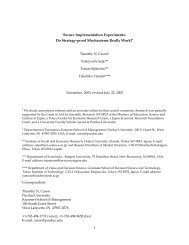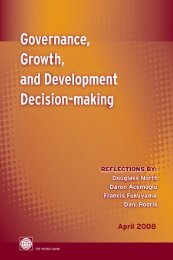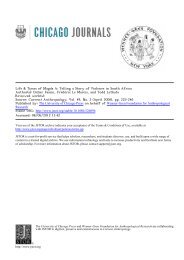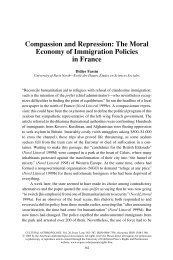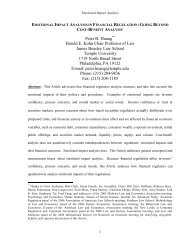The Tools of the Master Slavery and Empire in Nineteenth Century ...
The Tools of the Master Slavery and Empire in Nineteenth Century ...
The Tools of the Master Slavery and Empire in Nineteenth Century ...
Create successful ePaper yourself
Turn your PDF publications into a flip-book with our unique Google optimized e-Paper software.
6 THE TOOLS OF THE MASTER<br />
part <strong>of</strong> Egypt. <strong>The</strong> expansion <strong>of</strong> Egypt’s educational system as a result <strong>of</strong> <strong>the</strong> government’s<br />
project to “civilize” <strong>the</strong> Sudanese also caused Egyptians to travel <strong>the</strong>re as teachers. <strong>The</strong><br />
journey <strong>in</strong> <strong>the</strong> o<strong>the</strong>r direction was undertaken by thous<strong>and</strong>s <strong>of</strong> Sudanese doormen <strong>and</strong><br />
wagon-drivers, servants <strong>and</strong> slaves as well as by <strong>the</strong> wealthy caravans <strong>of</strong> Sudanese traders.<br />
Those groups <strong>of</strong> Sudanese who worked <strong>in</strong> Cairo <strong>and</strong> Alex<strong>and</strong>ria <strong>of</strong>ten belonged to <strong>the</strong>ir own<br />
guilds <strong>and</strong> were well-<strong>in</strong>tegrated <strong>in</strong>to urban economic life. From <strong>the</strong> early days <strong>of</strong> Muhammad<br />
`Ali’s reign, Sudanese students had also made <strong>the</strong> trip to Cairo to study at al-Azhar. <strong>The</strong>re<br />
were many ways for Sudanese <strong>in</strong> Egypt to earn <strong>the</strong>ir livelihoods <strong>and</strong> participate <strong>in</strong> urban<br />
culture <strong>and</strong> <strong>the</strong>y represented a familiar part <strong>of</strong> <strong>the</strong> demographic l<strong>and</strong>scape.<br />
However ambivalent <strong>the</strong>ir representations, <strong>the</strong> Sudanese were clearly considered by<br />
many Egyptians to be a part <strong>of</strong> Egypt. This connection developed <strong>in</strong>to a pronounced sense<br />
<strong>of</strong> possessiveness about <strong>the</strong> Sudan by <strong>the</strong> late n<strong>in</strong>eteenth century. In an article published <strong>in</strong><br />
Paris several years after <strong>the</strong> famous slavery trial <strong>of</strong> <strong>the</strong> pashas, <strong>the</strong> charismatic nationalist<br />
leader Mustafa Kamil wrote that “<strong>the</strong> Sudan, as is clear to <strong>the</strong> reader, is a piece <strong>of</strong> Egypt <strong>and</strong><br />
has been stripped from her without legal right.” Fear<strong>in</strong>g that <strong>the</strong> British were ready to conquer<br />
<strong>the</strong> Sudan—a fear shared by many <strong>in</strong> Egypt <strong>and</strong> soon to be proven correct—Kamil<br />
characterized <strong>the</strong> country as “Egyptian property” to which <strong>the</strong> British had no right. So as<br />
not to leave doubts about <strong>the</strong> forcible nature <strong>of</strong> Egypt’s potential reconquest <strong>of</strong> <strong>the</strong> region<br />
lost to <strong>the</strong> Mahdi, Kamil announced that “our army, even less than our whole army, would<br />
have been enough to accomplish this result.” 15 While echo<strong>in</strong>g similar assumptions about<br />
knowledge <strong>of</strong> <strong>and</strong> power over <strong>the</strong> Sudan that a British statesmen like Lord Balfour held for<br />
Egypt, <strong>the</strong> article also carries <strong>the</strong> stamp <strong>of</strong> anger <strong>and</strong> defiance aga<strong>in</strong>st <strong>the</strong> British.<br />
What Mustafa Kamil expressed, as did many o<strong>the</strong>r <strong>the</strong>oreticians <strong>of</strong> Egyptian nationalist<br />
ideals, was <strong>the</strong> perspective <strong>of</strong> <strong>the</strong> colonized colonizer. <strong>The</strong> world <strong>in</strong> which <strong>the</strong>se men lived,<br />
<strong>and</strong> <strong>the</strong> nation <strong>the</strong>y imag<strong>in</strong>ed for <strong>the</strong> next generation <strong>of</strong> Egyptians, was structured by a<br />
Janus-like vision <strong>of</strong> an Egypt whose past greatness <strong>and</strong> regional power could be grasped once<br />
aga<strong>in</strong> <strong>in</strong> <strong>the</strong> Sudan, thus free<strong>in</strong>g Egyptians from <strong>the</strong> political <strong>and</strong> economic control <strong>of</strong> <strong>the</strong><br />
British government. For Mustafa Kamil, <strong>the</strong> Sudan was Egypt’s by right <strong>and</strong> by nature;<br />
British control <strong>of</strong> Egypt was all <strong>the</strong> more tyrannical for its denial <strong>of</strong> Egyptian rights <strong>of</strong> sovereignty<br />
over <strong>the</strong> Sudan. <strong>The</strong> defenders <strong>of</strong> <strong>the</strong> pashas dur<strong>in</strong>g <strong>the</strong> slavery trial spoke from this<br />
vantage po<strong>in</strong>t when <strong>the</strong>y condemned <strong>the</strong> trespass <strong>of</strong> <strong>the</strong> British authorities <strong>in</strong>to Egyptian<br />
households <strong>and</strong> when <strong>the</strong>y upheld <strong>the</strong> custom <strong>of</strong> domestic slavery as a civiliz<strong>in</strong>g mission that<br />
saved <strong>the</strong> Sudanese—women <strong>in</strong> particular—from <strong>the</strong> supposed barbarity <strong>in</strong> which <strong>the</strong>y had<br />
been born.<br />
This dualistic nationalism did not beg<strong>in</strong> <strong>in</strong> 1894 with <strong>the</strong> slavery trial, nor did it reach<br />
its culm<strong>in</strong>ation with <strong>the</strong> untimely death <strong>of</strong> Mustafa Kamil <strong>in</strong> 1908. <strong>The</strong> outlook <strong>of</strong> <strong>the</strong> colonized<br />
colonizer began to take shape <strong>in</strong> <strong>the</strong> last decade <strong>of</strong> Muhammad Ali’s reign, <strong>and</strong><br />
emerged <strong>in</strong> full bloom by <strong>the</strong> 1870s. Nationalists developed <strong>the</strong>se <strong>the</strong>mes through <strong>the</strong> rest<br />
<strong>of</strong> <strong>the</strong> n<strong>in</strong>eteenth century, but <strong>the</strong>y were evoked with more urgency <strong>in</strong> 1898-99, <strong>the</strong> period<br />
<strong>of</strong> <strong>the</strong> British reconquest <strong>of</strong> <strong>the</strong> Sudan. By 1919 <strong>the</strong>re was a well-established slogan that<br />
called for “<strong>the</strong> unity <strong>of</strong> <strong>the</strong> Nile Valley.” Although <strong>the</strong>re were important exceptions, such as<br />
<strong>the</strong> nationalist writers or leaders who disliked <strong>the</strong> idea <strong>of</strong> coloniz<strong>in</strong>g <strong>the</strong> Sudan or who feared<br />
its implications <strong>of</strong> racial discrim<strong>in</strong>ation, most <strong>of</strong> <strong>the</strong> nationalists explored <strong>in</strong> this study agreed<br />
that what made <strong>the</strong> Egyptian struggle for <strong>in</strong>dependence undeniable was its unique relationship<br />
<strong>of</strong> mastery over <strong>the</strong> Sudan.<br />
By <strong>the</strong> late n<strong>in</strong>eteenth century, Egypt had experienced imperialism on many levels.<br />
Conquered by Sultan Selim I <strong>in</strong> 1516, Egypt was by <strong>the</strong> early n<strong>in</strong>eteenth century a country<br />
steeped <strong>in</strong> <strong>the</strong> traditions <strong>of</strong> Ottoman empire, with a rul<strong>in</strong>g class <strong>of</strong> Ottoman governors,



